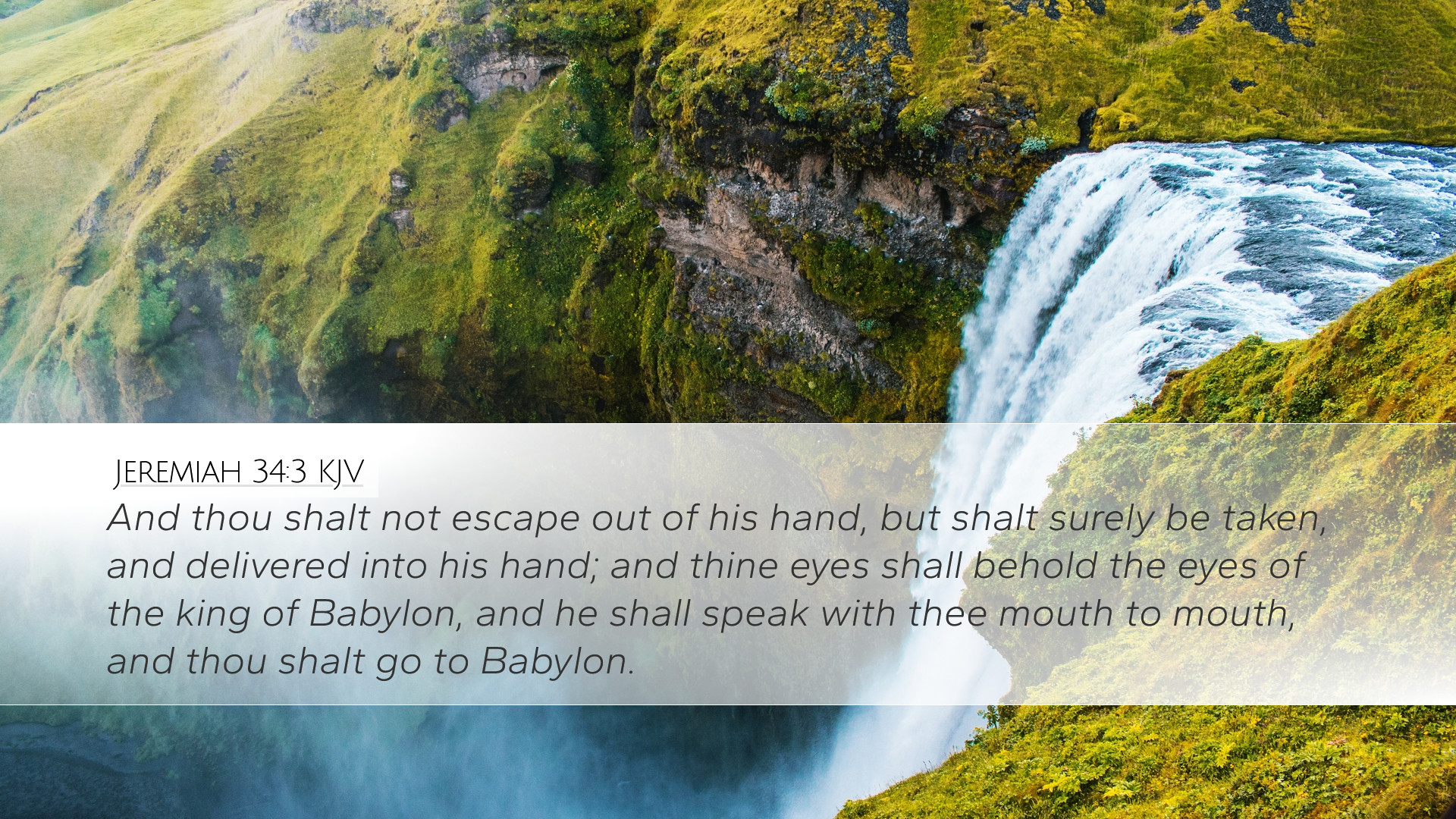Commentary on Jeremiah 34:3
The verse Jeremiah 34:3 states: "And thou shalt not escape out of his hand, but shalt surely be taken, and delivered into his hand; and thine eyes shall behold the eyes of the king of Babylon, and he shall speak with thee mouth to mouth, and thou shalt go to Babylon." This verse signifies a profound moment of judgment for Jerusalem and reflects God's sovereignty in human affairs.
Context and Background
Understanding Jeremiah 34:3 requires us to consider the historical and theological context of the passage. At this juncture, Jerusalem is under siege by Nebuchadnezzar, the king of Babylon. God, through the prophet Jeremiah, delivers a message of impending doom, highlighting the severe consequences resulting from the people's disobedience and rebellion against His covenant.
Insights from Public Domain Commentaries
Matthew Henry's Commentary
-
Divine Judgment: Henry emphasizes that this passage showcases God's judgment upon the nation of Judah. Their refusal to heed God's warnings through Jeremiah led to a dire consequence—captivity.
-
Fulfillment of Prophecy: Henry notes that God’s judgments are to be understood as fulfillments of previous prophecies. The king of Babylon represents the instrument of God's will.
-
Fear and Humiliation: The latter part of the verse reflects ultimate humiliation; for the people would see the king and speak to him face to face, denoting their total subjugation and loss of autonomy.
Albert Barnes' Notes on the Bible
-
Assured Captivity: Barnes elucidates that the certainty of being delivered into the hands of Nebuchadnezzar underscores the inevitability of God's judgment. He portrays it as God's righteous decree against a rebellious nation.
-
The Role of Prophecy: Barnes explains that Jeremiah acts as the oracle of God, delivering messages that are not merely warnings but declarations of what will come to pass.
-
Interaction with the Ruler: The notion of seeing and speaking with the king signifies a personal encounter that illustrates the gravity of their situation—no longer an independent nation but a conquered people forced to confront their conqueror.
Adam Clarke's Commentary
-
Historical Insight: Clarke provides historical background regarding the Babylonian siege, stressing that awareness of these events heightens the moral implications of Jeremiah’s message. The people were not blind to their fate.
-
Theological Implications: Clarke elaborates on the nature of God’s sovereignty. His control over kingdoms and affairs of men is absolute, and this serves as a warning against pride and rebellion.
-
Confrontation and Accountability: Clarke draws attention to the personal accountability inherent in this verse. Not only will the captives witness their defeat, but they will also be compelled to acknowledge their decisions that led them there.
Theological Themes
-
The Sovereignty of God: This verse illustrates God’s absolute power over nations and history. He uses Babylon as an instrument to execute His judgments.
-
Judgment and Mercy: While the passage is one of judgment, it also indirectly warns of the grace available to those who repent and seek God's mercy before it is too late.
-
The Importance of Obedience: The dire consequences faced by Jerusalem serve as a reflection on the necessity of obedience to God's commands and the blessings that follow obedience versus the curses that follow disobedience.
Application for Today
For contemporary readers, Jeremiah 34:3 is a poignant reminder of the serious repercussions of turning away from God. It challenges individuals and communities to reflect on their faithfulness and responsiveness to divine counsel. As pastors, students, and theologians engage with this text, it becomes a call to both self-examination and collective repentance.
In pastoral ministry, this verse can serve as a powerful resource for teaching about God's judgment, justice, and mercy, emphasizing the importance of heeding God's voice through scripture and the prophetic ministry of the church today.
In conclusion, Jeremiah 34:3 encapsulates a significant moment in the history of Judah while serving as a timeless reminder of God's sovereignty and the serious nature of His judgment, encouraging a faithful response in alignment with His purposes.


